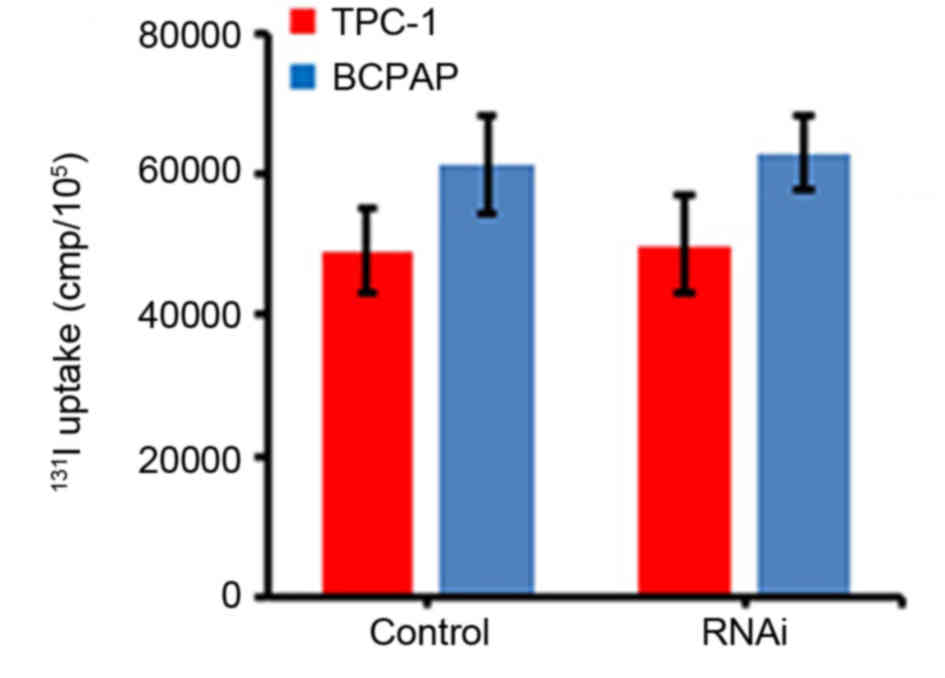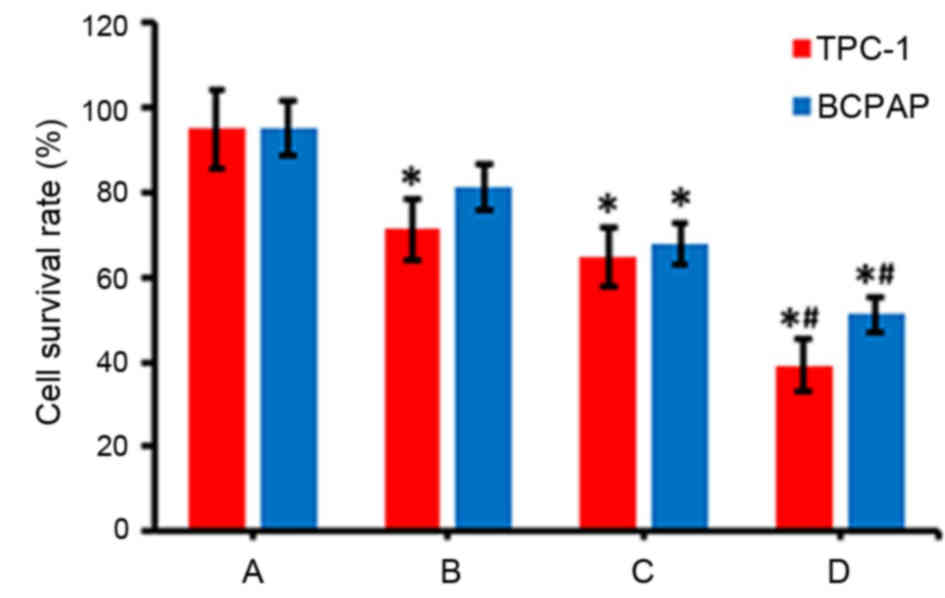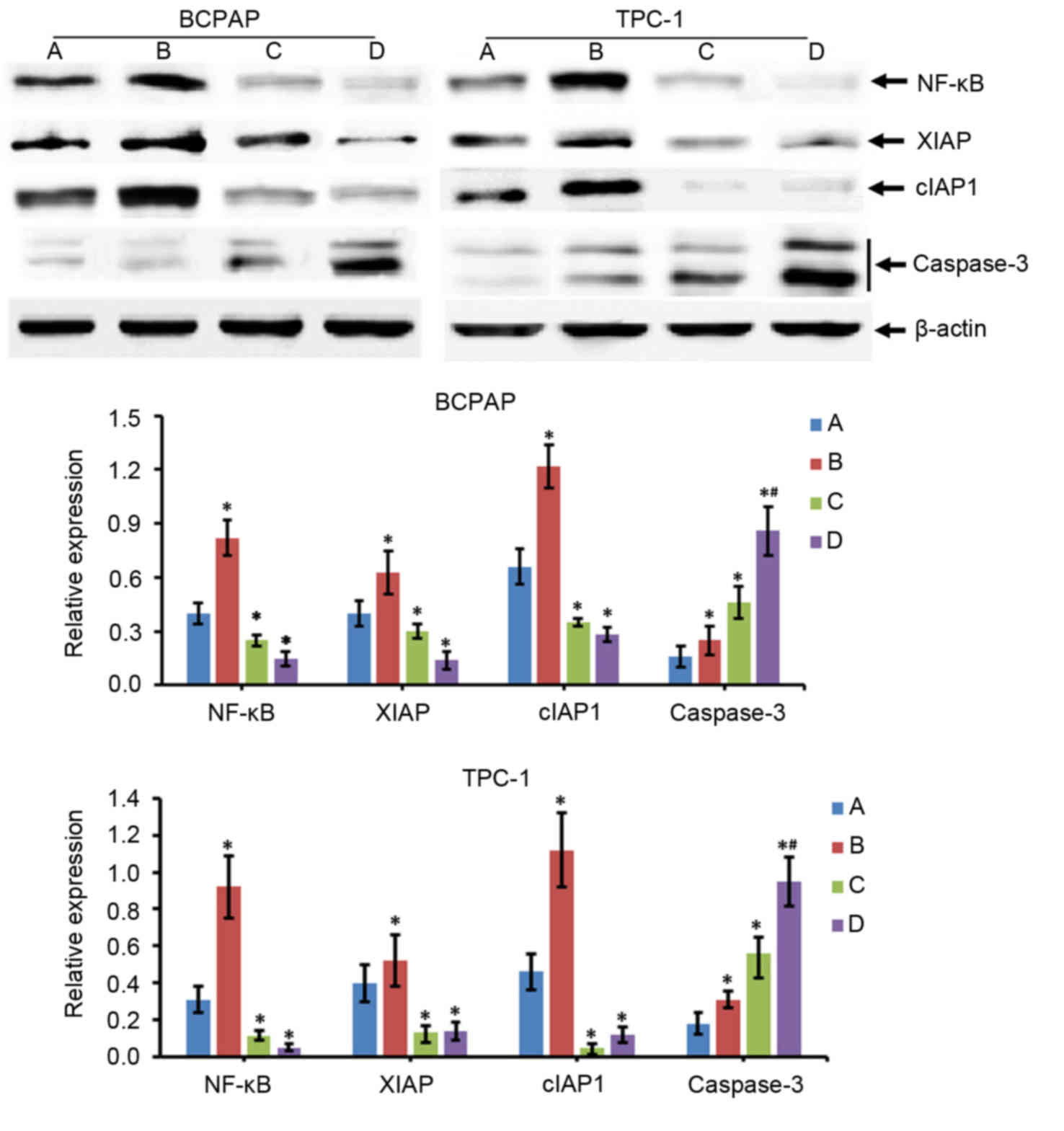|
1
|
Pellegriti G, Frasca F, Regalbuto C,
Squatrito S and Vigneri R: Worldwide increasing incidence of
thyroid cancer: Update on epidemiology and risk factors. J Cancer
Epidemiol. 2013:9652122013. View Article : Google Scholar : PubMed/NCBI
|
|
2
|
Londero SC, Krogdahl A, Bastholt L,
Overgaard J, Trolle W, Pedersen HB, Bentzen J, Schytte S,
Christiansen P and Godballe C; Danish Thyroid Cancer Group, :
Papillary thyroid microcarcinoma in Denmark 1996–2008: A national
study of epidemiology and clinical significance. Thyroid.
23:1159–1164. 2013. View Article : Google Scholar : PubMed/NCBI
|
|
3
|
Lin Y: Internal radiation therapy: A
neglected aspect of nuclear medicine in the molecular era. J Biomed
Res. 29:345–355. 2015.PubMed/NCBI
|
|
4
|
Pryma DA and Mandel SJ: Radioiodine
therapy for thyroid cancer in the era of risk stratification and
alternative targeted therapies. J Nucl Med. 55:1485–1491. 2014.
View Article : Google Scholar : PubMed/NCBI
|
|
5
|
Lu L, Shan F, Li W and Lu H: Short-term
side effects after radioiodine treatment in patients with
differentiated thyroid cancer. Biomed Res Int. 2016:43767202016.
View Article : Google Scholar : PubMed/NCBI
|
|
6
|
Hombach-Klonisch S, Natarajan S,
Thanasupawat T, Medapati M, Pathak A, Ghavami S and Klonisch T:
Mechanisms of therapeutic resistance in cancer (stem) cells with
emphasis on thyroid cancer cells. Front Endocrinol (Lausanne).
5:372014.PubMed/NCBI
|
|
7
|
Sen R and Baltimore D: Multiple nuclear
factors interact with the immunoglobulin enhancer sequences. Cell.
46:705–716. 1986. View Article : Google Scholar : PubMed/NCBI
|
|
8
|
Sen R and Baltimore D: Inducibility of
kappa immunoglobulin enhancer-binding protein Nf-kappa B by a
posttranslational mechanism. Cell. 47:921–928. 1986. View Article : Google Scholar : PubMed/NCBI
|
|
9
|
Vallabhapurapu S and Karin M: Regulation
and function of NF-kappaB transcription factors in the immune
system. Annu Rev Immunol. 27:693–733. 2009. View Article : Google Scholar : PubMed/NCBI
|
|
10
|
Hayden MS and Ghosh S: NF-κB, the first
quarter-century: Remarkable progress and outstanding questions.
Genes Dev. 26:203–234. 2012. View Article : Google Scholar : PubMed/NCBI
|
|
11
|
Zhang H and Sun SC: NF-kappaB in
inflammation and renal diseases. Cell Biosci. 5:632015. View Article : Google Scholar : PubMed/NCBI
|
|
12
|
Wertz IE and Dixit VM: Signaling to
NF-kappaB: Regulation by ubiquitination. Cold Spring Harb Perspect
Biol. 2:a0033502010. View Article : Google Scholar : PubMed/NCBI
|
|
13
|
Oeckinghaus A, Hayden MS and Ghosh S:
Crosstalk in NF-κB signaling pathways. Nat Immunol. 12:695–708.
2011. View
Article : Google Scholar : PubMed/NCBI
|
|
14
|
Pozdeyev N, Berlinberg A, Zhou Q, Wuensch
K, Shibata H, Wood WM and Haugen BR: Targeting the NF-κB Pathway as
a combination therapy for advanced thyroid cancer. PLos One.
10:e01349012015. View Article : Google Scholar : PubMed/NCBI
|
|
15
|
Li F and Sethi G: Targeting transcription
factor NF-kappa B to overcome chemoresistance and radioresistance
in cancer therapy. Biochim Biophys Acta. 1805:167–180.
2010.PubMed/NCBI
|
|
16
|
Lin Y, Bai L, Chen WJ and Xu SL: The
NF-kappa B activation pathways, emerging molecular targets for
cancer prevention and therapy. Expert Opin Ther Tar. 14:45–55.
2010. View Article : Google Scholar
|
|
17
|
Bauerle KT, Schweppe RE and Haugen BR:
Inhibition of nuclear factor-kappa B differentially affects thyroid
cancer cell growth, apoptosis, and invasion. Mol Cancer. 9:1172010.
View Article : Google Scholar : PubMed/NCBI
|
|
18
|
Phan T, Yu XM, Kunnimalaiyaan M and Chen
H: Antiproliferative effect of chrysin on anaplastic thyroid
cancer. J Surg Res. 170:84–88. 2011. View Article : Google Scholar : PubMed/NCBI
|
|
19
|
Letovsky SI, Cottingham RW, Porter CJ and
Li PW: GDB: The human genome database. Nucleic Acids Res. 26:94–99.
1998. View Article : Google Scholar : PubMed/NCBI
|
|
20
|
Camacho C, Coulouris G, Avagyan V, Ma N,
Papadopoulos J, Bealer K and Madden TL: BLAST+: Architecture and
applications. BMC Bioinformatics. 10:4212009. View Article : Google Scholar : PubMed/NCBI
|
|
21
|
Flux GD, Haq M, Chittenden SJ, Buckley S,
Hindorf C, Newbold K and Harmer CL: A dose-effect correlation for
radioiodine ablation in differentiated thyroid cancer. Eur J Nucl
Med Mol Imaging. 37:270–275. 2010. View Article : Google Scholar : PubMed/NCBI
|
|
22
|
Chen GF, Xu SH, Renko K and Derwahl M:
Metformin inhibits growth of thyroid carcinoma cells, suppresses
self-renewal of derived cancer stem cells, and potentiates the
effect of chemotherapeutic agents. J Clin Endocr Metab.
97:E510–E520. 2012. View Article : Google Scholar : PubMed/NCBI
|
|
23
|
Verburg FA, Stokkel MP, Düren C,
Verkooijen RB, Mäder U, van Isselt JW, Marlowe RJ, Smit JW, Reiners
C and Luster M: No survival difference after successful (131)I
ablation between patients with initially low-risk and high-risk
differentiated thyroid cancer. Eur J Nucl Med Mol Imaging.
37:276–283. 2010. View Article : Google Scholar : PubMed/NCBI
|
|
24
|
Kim WG, Ryu JS, Kim EY, Lee JH, Baek JH,
Yoon JH, Hong SJ, Kim ES, Kim TY, Kim WB and Shong YK: Empiric
high-dose 131-iodine therapy lacks efficacy for treated papillary
thyroid cancer patients with detectable serum thyroglobulin, but
negative cervical sonography and 18F-fluorodeoxyglucose positron
emission tomography scan. J Clin Endocr Metab. 95:1169–1173. 2010.
View Article : Google Scholar : PubMed/NCBI
|
|
25
|
Pacifico F and Leonardi A: Role of
NF-kappa B in thyroid cancer. Mol Cell Endocrinol. 321:29–35. 2010.
View Article : Google Scholar : PubMed/NCBI
|
|
26
|
Lampiasi N, Azzolina A, Umezawa K,
Montalto G, McCubrey JA and Cervello M: The novel NF-κB inhibitor
DHMEQ synergizes with celecoxib to exert antitumor effects on human
liver cancer cells by a ROS-dependent mechanism. Cancer Lett.
322:35–44. 2012. View Article : Google Scholar : PubMed/NCBI
|
|
27
|
Galbán S and Duckett CS: XIAP as a
ubiquitin ligase in cellular signaling. Cell Death Differ.
17:54–60. 2010. View Article : Google Scholar : PubMed/NCBI
|
|
28
|
Jiang CY and Lin X: Regulation of NF-κB by
the CARD proteins. Immunol Rev. 246:141–153. 2012. View Article : Google Scholar : PubMed/NCBI
|
|
29
|
Go HS, Seo JE, Kim KC, Han SM, Kim P, Kang
YS, Han SH, Shin CY and Ko KH: Valproic acid inhibits neural
progenitor cell death by activation of NF-κB signaling pathway and
up-regulation of Bcl-XL. J Biomed Sci. 18:482011. View Article : Google Scholar : PubMed/NCBI
|
|
30
|
Gyrd-Hansen M and Meier P: IAPs: From
caspase inhibitors to modulators of NF-kappa B, inflammation and
cancer. Nat Rev Cancer. 10:561–574. 2010. View Article : Google Scholar : PubMed/NCBI
|
|
31
|
Bratton SB and Salvesen GS: Regulation of
the Apaf-1-caspase-9 apoptosome. J Cell Sci. 123:3209–3214. 2010.
View Article : Google Scholar : PubMed/NCBI
|
|
32
|
Altieri DC: Survivin and IAP proteins in
cell-death mechanisms. Biochem J. 430:199–205. 2010. View Article : Google Scholar : PubMed/NCBI
|
|
33
|
Zhang SN, Deng BP, Zhang YY and Jiang NY:
Expression of miR-100 and RBSP3 in FTC-133 cells after exposure to
I-131. Nucl Med Commun. 35:932–938. 2014. View Article : Google Scholar : PubMed/NCBI
|
|
34
|
Duronio RJ and Xiong Y: Signaling pathways
that control cell proliferation. Cold Spring Harb Perspect Biol.
5:a0089042013. View Article : Google Scholar : PubMed/NCBI
|
|
35
|
Liu M, Sakamaki T, Casimiro MC, Willmarth
NE, Quong AA, Ju X, Ojeifo J, Jiao X, Yeow WS, Katiyar S, et al:
The canonical NF-kappaB pathway governs mammary tumorigenesis in
transgenic mice and tumor stem cell expansion. Cancer Res.
70:10464–10473. 2010. View Article : Google Scholar : PubMed/NCBI
|
|
36
|
Hinz M, Krappmann D, Eichten A, Heder A,
Scheidereit C and Strauss M: NF-kappaB function in growth control:
Regulation of cyclin D1 expression and G0/G1-to-S-phase transition.
Mol Cell Biol. 19:2690–2698. 1999. View Article : Google Scholar : PubMed/NCBI
|
|
37
|
Li XY, Abdel-Mageed AB, Mondal D and
Kandil E: The nuclear factor Kappa-B signaling pathway as a
therapeutic target against thyroid cancers. Thyroid. 23:209–218.
2013. View Article : Google Scholar : PubMed/NCBI
|


















